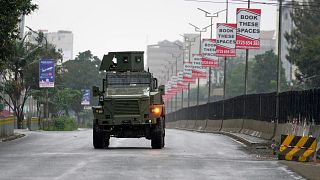Kenya
Kenyans lined up Saturday morning in Nairobi’s streets to view the body of the country’s late President Daniel Toroitich arap Moi, which is lying in state at Parliament Buildings in the Kenyan capital. Moi died Tuesday while receiving treatment at a Nairobi hospital.
As the national mourning period declared Tuesday by President Uhuru Kenyatta continues until Moi’s burial Wednesday, the death of Kenya’s second president spurs mixed reactions from Kenyans.
Throngs of Kenyans Saturday morning lined Nairobi streets waiting to enter Kenya’s Parliament Buildings to view the body of the country’s second president, Daniel arap Moi, who died Tuesday at the age of 95.
President Uhuru Kenyatta, in the early hours of Saturday, before heading to Parliament, eulogized the former president in a live televised broadcast from State House Nairobi, his official residence.
“Today as the solemn procession of the late President Moi’s remains proceeds to the streets of our nation’s capital, to lie in state at Parliament Buildings, we commence the final journey of a great son of Kenya, a cherished brother, a loving father, a mentor to many, a father of our nation, a champion of pan-Africanism, and the second president of the republic of Kenya,” Kenyatta said.
Kenyatta and first lady Margaret Kenyatta were the first to view the body, before other Kenyans, most of them admirers of the former president, got their chance.
Rebecca Andisi was happy to see the former president for the first time.
“I remember Moi as a president who helped people, people would go to him and he would help them, he paid school fees for school children,” she said. “May God rest his soul in eternal peace”
Moi served as Kenya’s president between 1978 and 2002. He took over the presidency on the death of the country’s first president, Jomo Kenyatta, in 1978. In 1982 he pushed a constitutional change that converted Kenya into a one-party state.
He ruled the country until 2002, when a coalition of Kenyan opposition parties, led by Mwai Kibaki, won an election that was termed as the country’s first free and fair elections.
At the height of his presidency and the clamor for a multiparty state in Kenya, Moi’s regime was accused of serious rights violations including torture and even political killings of opposing voices.
Timothy Njoya, a retired Presbyterian Church of East Africa minister was one of the main faces of Kenya’s opposition at that time, as was Mwakenya, an underground movement that was fighting for a multiparty democracy in Kenya.
In a 1986 sermon, Njoya told his congregation that they had “God-given rights” to question their government and that no one should let others make up their minds. He would then hand copies of the sermon out to his congregation. He was assaulted on several occasions for his activism and alienated from the church.
“It was voice of reason versus violence, actually brutal violence. We could not give up,” said Njoya. “All the Kenyan intellectuals, Kenyan people who were critical of Moi, and Mwakenya, all those people were called by Moi four big words — disgruntled, dissident, malcontent, subversive. All those people came to the pulpit on the streets. Moi shifted my pulpit from inside the church to the streets.”
The church restored him to ministry in 1991. He would preach ‘The 1986 sermon’ several more times after he was reinstated. Kenya finally became a multiparty state in 1992.
“To accept multiparty instead of going to a civil war, which other stupid dictators would have done, like in Congo, in Somalia, in Sudan,” said Njoya. “Many stupid dictators would have preferred to go to civil war than repent, so that’s one place I give Moi a tick, and a passport to go to heaven.
“Now he has died peacefully, in peace with all people, with his family, I think that he earned it. He earned it via those two events. The redeeming grace for Moi was accepting multiparty, and accepting the new constitution. That is his legacy”
The former president’s supporters, credit his leadership style for the maintenance of Kenya’s stability when other African countries were falling apart, riddled with military coups and civil wars.
Kenya’s government announced that Moi would be accorded a state funeral, the sixth state funeral in Kenya, and the second, after Kenya’s first president Jomo Kenyatta’s in 1978, to have full military honors. The burial date has been set for Wednesday.
AGENCIES












01:00
Gaza Christians killed in Israeli strike on church compound laid to rest
Go to video
Almost 300 killed in wave of violence in Sudan’s North Kordofan
01:11
World leaders express condolences over death of Nigerian ex-president Muhammadu Buhari
01:01
Kenya: Visa-free travel now available for many African and Caribbean countries
00:22
Boniface Kariuki, a Kenyan mask vendor shot at close range laid to rest
11:17
Bridging the legal gap in Africa’s digital boom {Business Africa}